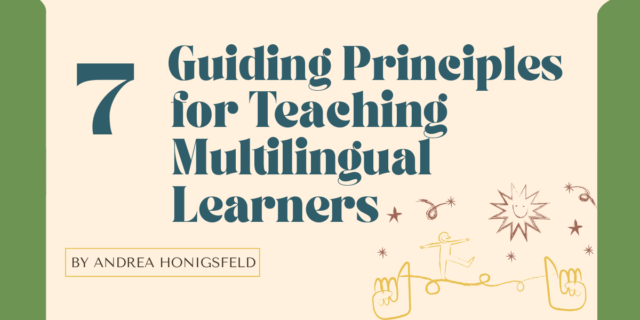
Developing level students are in a unique position. They have reached competence with basic conversational skills; have mastered some essential academic vocabulary; can decode and comprehend high-interest, low-readability texts; and get by using a range of helpful phrases and expressions. With careful scaffolding, ample visual support, and background knowledge about an everyday topic or academic content, they can access and gain a solid understanding of what is presented in class, participate fully, and maintain interest in challenging content. When it comes to expressing themselves orally or in writing, they use words, phrases, and short sentences with increasing confidence; they have yet to develop independent facility with more complex academic language and literacy skills, hence the name Developing.
Although there is no set definition of what developing means, by and large, your ELs at this level will successfully participate in everyday communicative activities and will be able to converse and read and write about a range of academic topics using appropriate vocabulary and basic grammatical structures. Let's look at what positive expectations you can have for Developing level students, or as aptly put by WIDA (2012), what these students can do.
When it comes to listening, you can expect your students at the Developing level to successfully participate in large-group or small-group activities within the following parameters:
- Follow directions with multiple steps
- Sequence information that is visually supported
- Locate or select key ideas from oral presentations
Regarding speaking skills, you will find it most rewarding to watch as your Developing level students become more comfortable with English and do the following:
- Participate in everyday conversations and basic academic dialogues
- Use vocabulary needed for everyday communication with increasing confidence
- Begin to self-correct
When it comes to reading, students at the Developing level are expected to show a range of skills that expend with focused instruction and sustained opportunities for practice:
- Read and comprehend key ideas in accessible resources
- Identify main ideas and key supporting details in a story
- Use context clues to figure out the meaning of words
Finally, in the area of writing, your Developing level students will gain new milestones as they begin to
- Begin to accurately use some context-specific vocabulary
- Compare and contrast ideas, people, and places
- Annotate reading selections with more detail
Students at the Developing level will best be supported through helping them expand their vocabulary, engaging them in academic conversations through sentence-level supports, and applying a range of additional scaffolding techniques and adaptations of grade-appropriate texts, assignments, and activities that challenge them and engage them.
…
The above has been adapted from Growing Language and Literacy. To learn more, visit Heinemann.com
 Follow us on Instagram @heinemannpub to stay up to date on the latest books, your favorite authors, and upcoming events!
Follow us on Instagram @heinemannpub to stay up to date on the latest books, your favorite authors, and upcoming events!
 Dr. Andrea Honigsfeld is Associate Dean and Director of the Doctoral Program (Educational Leadership for Diverse Learning Communities) at Molloy College, Rockville Centre, NY. Before entering the field of teacher education, she was an English as a Foreign Language teacher in Hungary (grades 5-8 and adult), an English as a Second Language teacher in New York City (grades K-3 and adult), and taught Hungarian at New York University. A Fulbright Scholar and sought after national presenter, Andrea is the coauthor or coeditor of 20 books on education and numerous chapters and research articles related to the needs of diverse learners. Andrea is coauthor of the Core Instructional Routines books with Judy Dodge. Visit Andrea at www.andreahonigsfeld.com
Dr. Andrea Honigsfeld is Associate Dean and Director of the Doctoral Program (Educational Leadership for Diverse Learning Communities) at Molloy College, Rockville Centre, NY. Before entering the field of teacher education, she was an English as a Foreign Language teacher in Hungary (grades 5-8 and adult), an English as a Second Language teacher in New York City (grades K-3 and adult), and taught Hungarian at New York University. A Fulbright Scholar and sought after national presenter, Andrea is the coauthor or coeditor of 20 books on education and numerous chapters and research articles related to the needs of diverse learners. Andrea is coauthor of the Core Instructional Routines books with Judy Dodge. Visit Andrea at www.andreahonigsfeld.com


